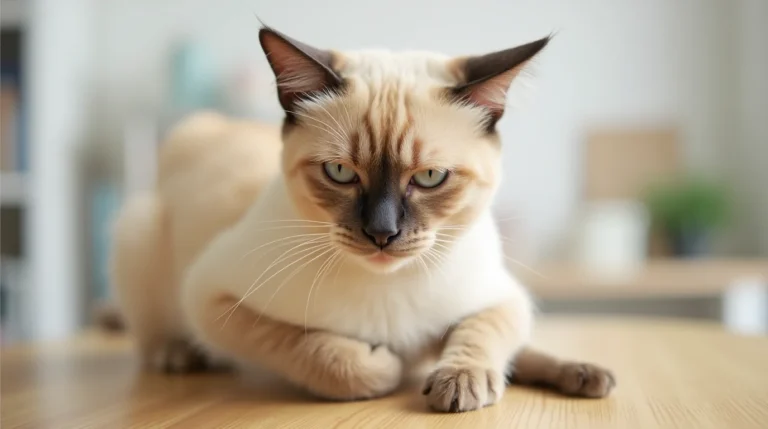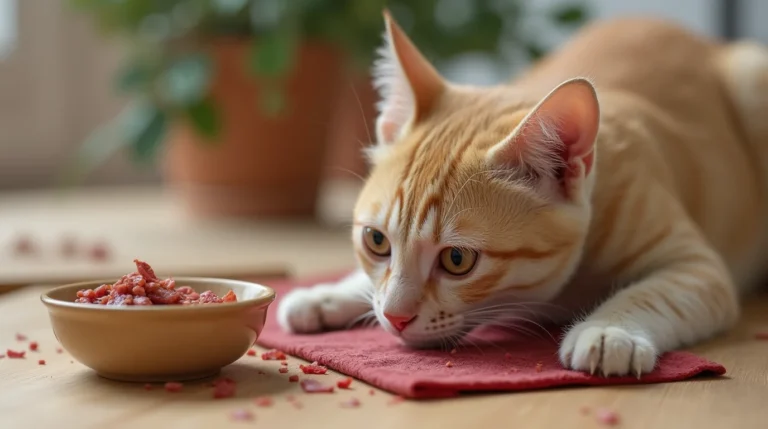Table of Contents
Cats with kidney issues require specialized care to lead comfortable, healthy lives. A renal diet for cats plays a critical role in managing these conditions by slowing the progression of kidney disease, maintaining proper nutrition, and improving overall quality of life.
In this article, we’ll explore what a renal diet is, its benefits, essential components, and how to transition your cat to a renal diet.
What is a Renal Diet for Cats?
A renal diet for cats is a specially formulated nutritional plan tailored to support cats suffering from chronic kidney disease (CKD) or other kidney-related health conditions.
These diets are designed to alleviate the strain on a cat’s kidneys while ensuring they receive the proper nutrients to maintain overall health.
Kidney disease affects the filtration process in a cat’s body, causing toxins to build up in the bloodstream. Renal diets minimize this strain by offering controlled levels of protein, phosphorus, and sodium, which are known to tax the kidneys.
Why is a Renal Diet Important for Cats with Kidney Disease?
1. Slowing Disease Progression
Cats with CKD often suffer from declining kidney function over time. A renal diet for cats helps slow this progression by reducing the workload on the kidneys.
2. Managing Toxin Levels
Kidneys filter waste and toxins from the bloodstream. When they’re impaired, toxins can accumulate and cause health problems. A renal diet helps minimize this risk by controlling the intake of certain nutrients.
3. Maintaining Proper Hydration
Renal diets are often formulated with higher moisture content to combat dehydration, a common issue in cats with kidney disease. Hydration is crucial for supporting kidney function and overall wellness.
Essential Components of a Renal Diet for Cats
1. Reduced Protein
While cats are obligate carnivores and require protein for survival, excessive protein intake can strain the kidneys. Renal diets include high-quality, easily digestible protein in lower amounts to reduce the burden.
2. Lower Phosphorus Levels
Phosphorus management is vital for cats with kidney disease. High levels of phosphorus accelerate kidney damage. A renal diet restricts phosphorus to prevent further decline in kidney function.
3. Controlled Sodium
High sodium levels can worsen hypertension and lead to fluid retention in cats with kidney disease. Renal diets include carefully controlled amounts of sodium to support overall cardiovascular and kidney health.
4. Omega-3 Fatty Acids
Omega-3 fatty acids, often sourced from fish oil, are included in renal diets for their anti-inflammatory properties. These fats help improve kidney function and reduce inflammation associated with kidney disease.
5. High Moisture Content
Many renal diets are available in wet food options to promote hydration. Cats with kidney issues are prone to dehydration, so providing moisture-rich food can significantly aid their condition.
How to Transition Your Cat to a Renal Diet
Switching your cat to a renal diet for cats requires patience and a gradual approach. Cats are creatures of habit and may resist sudden changes to their food. Here’s how to make the transition smoother:
1. Gradual Introduction
Start by mixing a small portion of the new renal diet with your cat’s current food. Gradually increase the ratio of renal diet to old food over 7–10 days.
2. Observe Preferences
Cats can be picky eaters. Offer both wet and dry renal diet options to determine which they prefer. Warm wet food slightly to enhance its aroma and make it more appealing.
3. Consult Your Veterinarian
Always consult your vet before starting a renal diet for cats. They can recommend specific brands or formulations tailored to your cat’s unique needs.
4. Avoid Free-Feeding
Serve measured portions at set times to monitor your cat’s appetite and ensure they’re eating the prescribed diet.
Homemade vs. Commercial Renal Diets
Commercial Renal Diets
These diets are professionally formulated to meet the specific nutritional needs of cats with kidney disease. Renowned brands like Hill’s Prescription Diet, Royal Canin, and Purina offer reliable options.
Homemade Renal Diets
While some owners prefer homemade diets, it’s crucial to consult a veterinary nutritionist to ensure the diet meets all of your cat’s needs. Incorrect formulations can lead to nutrient imbalances that worsen the condition.
Signs Your Cat May Need a Renal Diet
Not all cats with kidney issues show obvious symptoms. However, common signs that may indicate your cat could benefit from a renal diet for cats include:
- Increased thirst and urination
- Loss of appetite
- Weight loss
- Vomiting
- Lethargy
- Poor coat condition
If you notice any of these signs, consult your veterinarian for proper diagnosis and dietary recommendations.
Frequently Asked Questions About Renal Diets for Cats
1. Can I feed my healthy cat a renal diet?
Renal diets are specifically designed for cats with kidney disease and are not suitable for healthy cats. Healthy cats require higher protein and phosphorus levels to meet their nutritional needs.
2. How long can a cat live on a renal diet?
With early intervention and consistent care, many cats on a renal diet live several years after a CKD diagnosis. The diet significantly improves their quality of life.
3. Can I add supplements to a renal diet?
Always consult your vet before adding supplements. Some cats may benefit from additional omega-3s or probiotics, but unnecessary supplements can disrupt the diet’s balance.
4. What if my cat refuses the renal diet?
If your cat refuses to eat a renal diet, try offering different flavors, textures, or warming wet food. Work closely with your vet to find an acceptable alternative.
5. Are there natural remedies for kidney disease?
While some natural remedies like fish oil may support kidney health, they cannot replace a proper renal diet. Always prioritize vet-approved treatments and dietary plans.
6. Can renal diets reverse kidney disease?
No, renal diets cannot reverse kidney disease. However, they help manage the condition, slow its progression, and improve your cat’s quality of life.
Conclusion
A renal diet for cats is a cornerstone of managing kidney disease and promoting long-term health. By providing controlled levels of protein, phosphorus, and sodium, along with essential hydration, these diets reduce the strain on your cat’s kidneys and improve their overall well-being. Early intervention, proper diet, and regular veterinary care are essential for giving your feline companion the best chance at a comfortable life.



